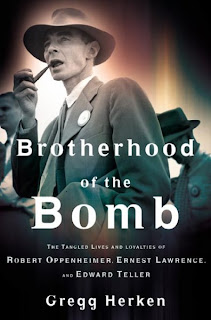Shatterer of Worlds

In the last three years at least a dozen new biographies of Albert Einstein have crossed my desk. This is only natural considering that 2005 was the century anniversary of his ‘miracle year’ when he published the three critical papers that would make up the theory of relativity. In the same time frame I’ve seen only half a dozen biographies of J. Robert Oppenheimer, father of the atomic bomb. I suppose less attention is natural. Einstein was the avuncular eccentric who discovered relativity, escaped the Nazis and warned President Roosevelt of the impending birth of nuclear weapons. (In fact, it was Einstein’s prescient letters to President Roosevelt that led to the creation of America’s nuclear program.)
On the other hand, J. Robert Oppenheimer was the genius tasked with countering this threat to the free world, and transforming a theory into fact. He succeeded spectacularly overseeing the construction of the world’s first atom bomb in just two years. This success earned him the sobriquet ‘father of the atom bomb.’ But after the war, Oppenheimer took a path different from the government and the military and found himself publicly tried and labeled a traitor.
Oppenheimer seemed born with a protean intellect. At the age of 11 he became the youngest member of New York Mineralogical Society and he regularly presented papers to this august group. He graduated from Harvard summa cum laude in just three years. He then completed graduate work at both Cambridge and University of Göettingen in Germany. In 1927 he returned to the United States after earning a doctorate for his thesis on quantum theory. Those close to ‘Oppi’ describe a man with a tireless, almost frightening, intellect. He settled and taught in Berkeley while also teaching at Cal Tech. In addition to teaching at two universities in a relatively new field he continued to make major contributions to the field of physics. At the age of 30 he acquired his eighth language: Sanskrit.
His students revered him to the point of following him from Berkeley to Pasadena, retaking his highly demanding classes and even mimicking his mannerisms. But there was a decidedly asocial, ivory tower side, to Oppenheimer. Some found him less than patient with his intellectual inferiors, and he took absolutely no interest in the world outside of academia. This ennui with the political world was shredded in the 1930’s by the depression, the Nazi Party and his first true love, Jean Tatlock. This last event was to have far reaching consequences for Jean Tatlock was a member of the Communist Party. With the coming of the war, and Einstein’s warning letters, Oppenheimer was asked to not only investigate the feasibility of an atomic weapon, but to also create one. His association with the Communist Party and Communist causes was deemed unimportant. He was placed in charge of the huge Manhattan Project. As one of his colleagues would later explain, “many physicists were drawn into this work by fate and destiny rather than enthusiasm.” However, there’s no indication that Oppenheimer lacked enthusiasm. In fact, physicist Hans Bethe stated that “Los Alamos might have succeeded without him, but certainly only with much greater strain, less enthusiasm, and less speed. He was a leader. He brought out the best in all of us.” When the test bomb ‘Fat Man’ was successfully exploded at Alamogordo, Oppenheimer seemed disturbed and famously quoted the Hindu Bhagavad-Gita: "I am become death, the Shatterer of Worlds." Yet when asked about dropping the new bomb on Japan, he unhesitatingly endorsed its use. He would later bitterly regret this decision. From 1947-1953 he would spend most of his energy attempting to stem the spread of nuclear weapons in general and the hydrogen bomb in particular.
This sudden stroke of conscience was considered a ‘character defect’ by many in government, and coupled with his earlier affiliation of Communism, doomed him. He was publicly charged with spying for the Soviet Union. There was an investigation by the FBI and a public hearing before Congress. Eventually, he was officially cleared of all charges, but the security clearance so important to his life’s work was revoked and the charge of nuclear espionage would forever follow him.
The Birmingham Public Library has over 70 books and DVDs on Einstein, Oppenheimer and other nuclear physicists. And no I didn’t read them all. Instead, I read several biographical sketches in our database Biography Resource Center +The Complete Marquis Who's Who. Check it out. It doesn’t list only scientists. You can find biographies of politicians, athletes, performers, just about anyone.
Comments